![]()
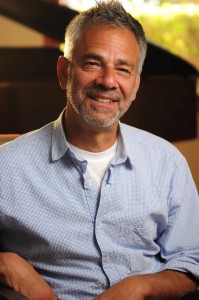
When editing a true story that is intense, but shot without glorifying the brutality, the editing serves to amplify the emotional impact. “When do we tap into the emotions of the audience and which emotions are we tapping into?” Rosenbloom questioned. “It was never done for horror. It was done for maximum emotional impact, not to repulse the audience, but to make them understand the psychology of this sociopath, if you can understand such a thing.”
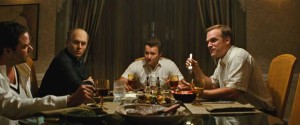
The dailies were terrific, so the filmmakers were excited by everything they saw, but there was a discovery process in the first cut. Rosenbloom put together some sequences, about 15 or 20 minutes of material, to show the director how it was going.
Based upon the book by Dick Lehr and Gerard O’Neill, the film changed from the script, but it was not a question of length, it was a question of what was important to the story the filmmakers were telling. Rosenbloom confirmed that there was some restructuring of scenes and “rethinking the timeline of events,” but nothing extraordinary. There was never a problem with performance. Rosenbloom also noted that it takes a big writer/director to be willing to rewrite in the editing room.
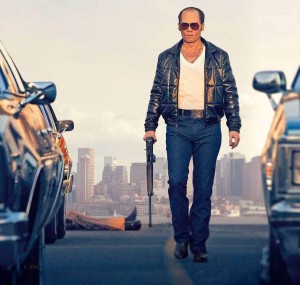 The most fun work occurred when discussing one character and the area of the interviews. It was also the area where the editing departed the most from the script. Originally the interviews were just of Kevin Weeks (Jesse Plemons) and his point of view.
The most fun work occurred when discussing one character and the area of the interviews. It was also the area where the editing departed the most from the script. Originally the interviews were just of Kevin Weeks (Jesse Plemons) and his point of view.
“When we shot part of that, I cut them in as scripted. I brought Scott in and we looked at it. We re-evaluated and at that time came up with idea of using Flemmi (Rory Cochrane) and Martorano (W. Earl Brown) as interviews as well,” shared Rosenbloom. “We tacked that onto the shooting schedule at the end and did the necessary rewrites to make that happen.”
The most difficult work for an editor is when something doesn’t work and a solution to the problem has to be figured out. Part of the joy of editing is that discovery. Rosenbloom believes the interviews would have been a problem if they had all been from Weeks’ point of view. “I don’t think those characters Flemmi and Martorano would have been as rich if they weren’t included in that.”
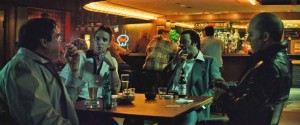 Rosenbloom explained how some things with Connolly’s (Joel Edgerton) character and “the trajectory” towards the end of the film had to be re-imagined. Some shots from previous scenes were re-purposed to fashion the sequence where Connolly is complicit in Bulger leaving town.
Rosenbloom explained how some things with Connolly’s (Joel Edgerton) character and “the trajectory” towards the end of the film had to be re-imagined. Some shots from previous scenes were re-purposed to fashion the sequence where Connolly is complicit in Bulger leaving town.
The dialog from the last meeting between the two, which had originally been scripted and shot in a church, was played over a long shot of their backs standing at the river that came from a scene, which did not make the final cut. Connolly was digitally erased from the church scene so the filmmakers could have Bulger alone and reflective in the church.
“It’s fun when that stuff works out. It wasn’t so much the execution as it was coming up with the idea. The objective is to do it, so that nobody notices and it feels like it was intended,” stated Rosenbloom, who admitted he sometimes feels a sense of betrayal when he exposes secrets in an interview. It is in the problem areas that an editor can exercise craft and bring creativity to the film.
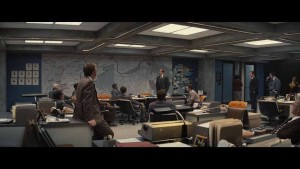 Rosenbloom thinks that the best directors have been actors at one point because the most important thing about any movie is well-performed, relatable characters. Characters are the audience’s “portal into the film.”
Rosenbloom thinks that the best directors have been actors at one point because the most important thing about any movie is well-performed, relatable characters. Characters are the audience’s “portal into the film.”
Rosenbloom, who had worked on a film with Depp previously, was happy that the actor finally had a part worthy of his talent. In his opinion, Depp “was capable of doing anything.” Performances from the whole cast provided a wealth of riches for editing. If he were to single out any of the other performances, it would be that of Julianne Nicholson who plays Connolly’s wife and who did “a fantastic job in only three scenes.”
It was a great experience working with Cooper. Rosenbloom said the director was pleasant to work with, not pushy or impatient, but rather a wonderfully talented filmmaker who, “Always allowed me the time to think.”
“I’m really proud of this movie from beginning to end,” added Rosenbloom. “I’m proud of the relationship I’ve formed with Scott. To see him grow as a filmmaker from his first film to this his third film has been a treat.”





